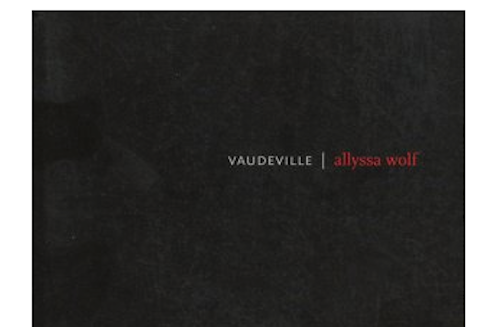Of Allyssa Wolf's Vaudeville or My Altamont Blues, part I
BY Philip Jenks

Ever. Ways time is demarcated, its temporal forensics—the rights reserved. pages we share. or thieve. Or maybe in sequence, other texts and tests which appear nearby. Chronological, comparative. Such linear delineations make little sense, although they are logical. It’s been ten years since Allyssa Wolf’s Vaudeville was published. It says so on the page, but I’m having trouble believing. Dare to suggest a timeless text was written not in some other era, not by some dead white man, not. I cannot prove anything (the analytics versus “Being, but an Ear” (Dickinson 340)), oppose the best of, but Wolf’s is verse in its purest form. Speaks to and with. Ghosts, power relations, inhabitations, gender powers, the animals, comedic horrors, and language twisting old English into the presences, or wars, just: “twisting the night away” (Wolf 37). It’s a “real show” with all the horror and comity of being, shredded thus. What brilliant bleeding of The Doll Series as Wolf writes in “The Third Doll”:
Shades of makers of the world
Concluded with a smear of stars
Behind the eyes staring down
Electricity and flood, staring
Beyond that, far too much
Playing at liberty
After they painted and sliced a mouth
I desired a sex, and thought
To smile, what is it? now
am in this body (13)
These poems possess or displace a cosmogony of shattered Being, “Wrecked, solitary, here –“ (Dickinson 340). These “(threads extending from torn places/bow towards the sound of burning.” The doll number plays tricks on the “makers of the world” and the excesses of “Playing at liberty.” Masculinist inscriptions. Who paints and slices mouths. The powers of floods and electricity. And brought into this body at the thought of smiling. They are shades who make and smear and stare. Analogies can (are?) dangerous things and yet I’ll voice some. The text is also a philosophical tract or set. Or set on a stage. The text is a philosophical dance.
When I had the fortune of being found (this text), things were after a promising stay in Portland, smashed up American dreams, divorce and leaving town. and also explosive new beginnings, began touring with The Howling Hex. Once to a show in Portland to read some poems and not far thereafter, on tour. Idle worship. Idol warships. Neil Michael Hagerty was reversing some serious death trips, what had “ turned the vertical into hearses,” his were lyrics that reverses all being, and yet. to stage something. was not prepared or repaired for that one. What is this place?! Everything that had ever been expected had thus been upended. Soon after, having met both Wolf and Hagerty, it seemed my dreams come true. Heroics! An open world and down with what was. Also many others! Simone Muench and thriving poetry and music communities in Chicago. Drag City. Rian Murphy. Peter O’Leary. With limited reflection, the world then was “mine.” I had forgotten the very warnings that got me there. As Lennon reminds, “The Dream is over/What can I say?” (“God”, John Lennon/Plastic Ono Band). Multiplications of disbeliefs,
What life was a life. Who a surface could save. To
become. In a world. Obsolescence.
A singing creature, by trade. Not singing. Out it all
By trade. Out as creatures. By trade. Obsolescence
Nor salvation. Choosing what. Comes the black,
muscled cat (Wolf M, The Dancer 41)
Simile does not ease me. Simile or analogy to dis-ease, but perhaps in it some comforts. For me, Luce Irigaray’s Elemental Passions undulates likewise with warning and possibilities. Tangles at the making. and corporeal. even sexual dynamics (“Remember Freud?”). To be of trade and obsolete. this the verse not only of being, but also of its dim etchings. of being traded with no salvation. being, one might mistakenly think is mistaken or a making of there in. No. There’s a distinctive ecology throughout Vaudeville. Do not miss the cat. “And thus I had no relationship with time, other than that of your production” (Irigaray, Elemental Passions, 62):
White. Immense spaces. White a rush of breath. Be
swift, marry this breath. Remain in it. Make haste.
Let it not abandon me. Let me not turn from it. Be
swept up: my song.
You give me a blank white mouth. My white
mouth....I can say nothing but sing. (Irigaray 7)
Poetry of the wound and the wound up, “Does that wound remind you of your sensory resources?” (Irigaray 83). By trade. “An exchange of nothing?” (Irigaray 63). By trade, living in, “The economy of which does not easily appreciate the price” ....Is this, “A scansion of space and time in between the poles and the tides”? (Irigaray 63).
How at least for me, the bruises of Altamont are so expertly narrated at the end of Wolf’s “M, The Dancer.” and these “angels” have a damage of the earliest type. Sophoclean. “Wild angels” who have “no weddings” and “no guests” on the streets. and they would go speechless. the uses and abuses. Or, “a well-worn throat”—“To see them. What is called. / The working youth. The fucking youth. From time. to time. // Times. Commission no saint. What is called. The fucking you. The working you. To paint out the eyes. Painting. Out of the dirt and the pink. // A little street for wild angels. Wild angels to go” (42).
Of a molesting world of exchange, an exchange of the spirit for profit. Ian Curtis’ “No Love Lost” (“No life at all in the house of dolls”). reversal of the saintly and magic of all the little angels now bedraggled in the work. A well-worn throat. with voice face throat painted out. Out in the streets. “It’s just a shot away...”
The son of an Episcopalian minister, Philip Jenks was born in North Carolina and grew up in Morgantown...
Read Full Biography

